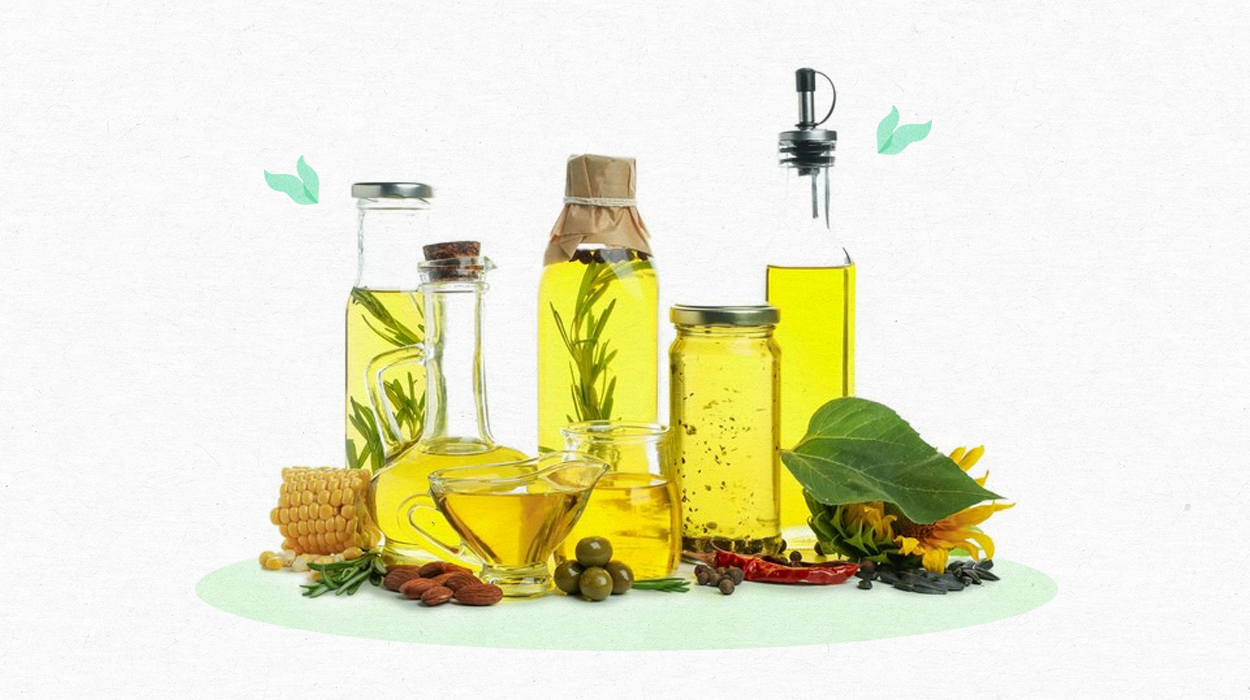 Evidence Based
Evidence Based
Evidence Based
This article is objectively based on relevant scientific literature, written by experienced medical writers, and fact-checked by a team of degreed medical experts.
Our team of registered dietitian nutritionists and licensed medical professionals seek to remain objective and unbiased while preserving the integrity of any scientific debate.
The articles contain evidence-based references from approved scientific sites. The numbers* in parentheses (*1,2,3) will take you to clickable links to our reputable sources.
Is Vegetable Oil Vegan? The Answer In 2024 Is Yes & Here’s Why

Following a vegan diet requires one to question the everyday cooking ingredients most overlook. Cooking oils are a staple in many kitchens, used in various applications from frying to seasoning. So, it’s crucial to check into your oil’s vegan status to maintain a vegan lifestyle.
Is vegetable oil vegan? Let’s look more closely at this popular oil. We’ll discuss its vegan status and health effects and learn more about how it’s used in vegan recipes.
Is Vegetable Oil Vegan-Friendly?
Yes, vegetable oil is vegan. It is derived from plant sources and contains no animal products or by-products.
Still, consumers should ensure it’s not processed in facilities that may cause cross-contamination with non-vegan products. Checking production methods to ensure specific brands align with your vegan ethical beliefs is also crucial.
Contact manufacturers directly to determine whether your vegetable oil is certified vegan if necessary.
Is Vegetable Oil Allowed On A Vegan Diet?
Yes, vegetable oil is allowed on a vegan diet.
Vegetable oil comes from plant-based sources such as seeds, nuts, and fruits. It is a versatile cooking oil that can be used for frying, baking, and making dressings or sauces. It is suitable for vegans because it contains no animal products or animal by-products.
Many vegans rely on vegetable oil as a primary fat source because of its plant-based origins. Various vegetable oil options are available, such as olive oil, sunflower oil, avocado oil, and canola oil. All of these are suitable vegan cooking oils.
Vegetable oil also offers various nutrients, like omega fatty acids, which benefit those following vegan diets. Overall, vegetable oil is a valuable and healthy addition to many vegan food dishes.
What Is Vegetable Oil?
Vegetable oil is a broad term used to describe any plant-derived oils that are liquid at room temperature. Vegetable oil usually refers to canola oil or soybean oil. However, several different types of oils fall into the category, including:
- Olive Oil: Extracted from olives, it’s renowned for its health benefits. It is a staple in many Mediterranean dishes and used in a wide variety of cuisines. And, of course, olive oil is vegan.
- Sunflower Oil: Sunflower oil is known for its light taste and is derived from sunflower seeds.
- Canola Oil: Canola oil is typically used for frying because it has a high smoke point. It is made from the seeds of the canola plant.
- Coconut Oil: Although solid at room temperature, coconut oil melts upon heating. It’s extracted from coconut meat.
- Soybean Oil: Produced from soybeans, this oil is used in various food products.
- Corn Oil: Corn oil is frequently used for frying and is derived from corn kernels.
- Avocado Oil: Avocado oil is rich and smooth, made from the flesh of ripe avocados. It can be used for sautéing, grilling, and frying. It is also a popular choice for dressings, drizzles, and marinades.
Each type of vegetable oil has distinct characteristics regarding flavor, nutritional content, and cooking uses. All are suitable for a vegan lifestyle.
Vegetable Oil Utility
Vegetable oil has a myriad of uses, from the kitchen to the manufacturing industry.
Here are some primary uses of vegetable oil:
Cooking And Frying

Most vegetable oils can withstand high cooking temperatures due to their high smoke point. This makes it ideal for frying foods, ensuring they turn out crispy without burning.
Research shows sunflower oil has the highest smoke point,[1] meaning it can be used at high temperatures, while coconut oil has a low smoke point. Sesame oil is one of the most stable oils for high-temperature frying.
Conversely, the oil that degrades the most[2] at high temperatures is olive oil.
Baking
Vegetable oil also adds moisture to baked goods. It’s a standard cooking option for cakes and muffins because it ensures they are soft and flavorful.
Salad Dressings

When combined with vinegar or lemon juice, vegetable oil creates an excellent base for dressings.
One of the best vegetable oils for salad dressings is extra-virgin olive oil. Studies show that heating olive oil degrades its antioxidant capacity,[3] so it’s healthier to consume it cold.
Marinades
Vegetable oil also serves as the base for marinades. When mixed with herbs and spices, it adds flavor to infuse meats and vegetables.
Processed Food Production
Vegetable oil is often used to manufacture processed foods like chips, snacks, and certain ready-to-eat meals. Unfortunately, the cheapest, least healthy vegetable oils tend to be used.
The most profitable vegetable oil used in processed foods is palm oil.[4] Palm oil production methods have significant negative impacts on human, animal, and planetary health. So, is palm oil vegan? Many vegans think not because of animal habitat destruction.
Non-Culinary Uses
Vegetable oil is used beyond cooking. It is found in products like soaps, cosmetics, and even certain biofuels. Studies show that vegetable oils can have wound-healing properties[5] for the skin.
Vegetable Oil Nutrition Content
Vegetable oils are rich in healthy fats,[6] specifically unsaturated fats, which research shows are good for heart health.
Olive and canola oil contain monounsaturated fats, while sunflower and corn oil contain polyunsaturated fats. The healthiest fats are essential omega-6 and omega-3 fatty acids, which we must obtain from food. They are vital for health because the human body cannot produce them itself.
Many vegetable oils also contain fat-soluble vitamins and minerals, like vitamin E.[6] Some vegetable oils are also rich sources of health-promoting antioxidants.
Is Vegetable Oil Healthy?
Vegetable oil has a mixed profile when it comes to its health benefits.
The healthiest oils are rich in healthy fats, such as monounsaturated and polyunsaturated fats, which can promote heart health. For example, regular consumption of olive oil, rich in monounsaturated fat, is associated with a reduced risk of cardiovascular disease.[7] Omega-3 and omega-6 have anti-inflammatory properties that reduce disease risk and severity.[8]
Fat-soluble vitamin E also benefits skin health and cell protection. Adding vegetable oil to your diet can also increase the absorption of fat-soluble carotenoids[9] and vitamins from supplements such as green powders.
Finally, studies suggest that plant-based oils may have a beneficial impact[10] on gut health.
Eating fried foods is thought to be linked to poor health. However, recent research suggests that the myth that frying foods in vegetable oil can cause heart disease is not supported by scientific evidence.[11]
Conversely, coconut oil is high in saturated fat, which is considered unhealthy. Studies show that coconut oil, vegan or not, may increase cholesterol levels[12] and hence isn’t a healthy choice. Unfortunately, coconut oil is used in processed vegan foods like vegan cheeses.[13]
While some vegetable oils offer health benefits, they are also calorie-dense. This can contribute to weight gain when consumed in excess. Some refined vegetable oils also undergo processing that strips away nutrients and creates harmful trans fats.[14]
Vegetable oils can be part of a healthy diet when consumed in moderation. However, choosing unrefined versions and avoiding those high in saturated fats is essential.
Does The Production Of Vegetable Oil Affect Animal Life?
Some vegetable oil production may impact animal life and may not be considered completely vegan. Here are some ways oil production methods can impact the vegan community:
Habitat Destruction
Vegetable oil crop cultivation typically involves deforestation. Native forest destruction is particularly common with palm oil production.[15] The rapid expansion of palm oil plantations has severely affected animals like orangutans, tigers, elephants, and rhinos by shrinking their habitats.
Pesticides And Chemicals
Large-scale farming of fruits and veggies for oil crops often uses pesticides and chemicals during production. This process may contaminate water sources,[16] impacting aquatic life.
During shipping, vegetable oil spills[17] can be detrimental to aquatic ecosystems.
Choose organic canola oil to reduce the negative environmental impact of vegetable oil cultivation.
Soil Health
Intensive farming can impact soil quality over time. This affects the insects and microorganisms living in it. In turn, this may also impact larger animals that feed on these organisms.
Climate Change
Deforestation for vegetable oil production may also contribute to global warming. Climate pattern changes can further disrupt animal habitats. It can also impact the migration patterns of various animals.
Varieties Of Other Vegan Oils
Here is a list of vegan oils besides the typical vegetable oils already mentioned:
- Flaxseed oil.
- Hemp seed oil.
- Walnut oil.
- Grapeseed oil.
- Sesame oil.
- Safflower oil.
- Peanut oil.
- Argan oil.
- Macadamia nut oil.
- Rice bran oil.
- Hazelnut oil.
Final Words
Vegetable oil is an excellent option for those following a vegan lifestyle. There are many types of vegetable oils, the most common being canola, soybean, and olive oil. All are derived from plants.
However, while vegetable oils are plant-based, checking into production methods is vital. When not managed sustainably, these methods can significantly impact animal life and change the vegan status of these oils.
Frequently Asked Questions
Vegetable oil is not made from vegetables like carrots or broccoli. It’s a term used to refer to oils extracted from seeds, nuts, or fruits of certain plants.
Yes, vegans can eat vegetable oils. However, production methods should be checked to ensure they align with the ethical beliefs of the vegan community. Most vegans avoid palm oil due to its association with the destruction of animal habitats.
Most cooking oils are inherently vegan. Although not oils, some fats, such as lard and tallow, used for cooking and frying, aren’t vegan. Many consider palm oil as not suitable for vegans.
Yes, both vegetable oil and canola oil are vegan.
Usually, yes. Although most vegetable oils are vegan, it’s crucial to check production processes to be sure. You can use a company focusing explicitly on vegan meal delivery or vegan meal replacement services to ensure your oil is vegan.
+ 17 sources
Health Canal avoids using tertiary references. We have strict sourcing guidelines and rely on peer-reviewed studies, academic researches from medical associations and institutions. To ensure the accuracy of articles in Health Canal, you can read more about the editorial process here
- Fereshteh Ramroudi, Yasini, A., Arefeh Dehghani Tafti and Elham Khalili Sadrabad (2022). Investigation of the Physicochemical Properties of Vegetable Oils Blended with Sesame Oil and Their Oxidative Stability during Frying. International journal of food science, [online] 2022, pp.1–8. doi:https://doi.org/10.1155/2022/3165512.
- Andrés Jiménez-Sánchez, Antonio Jesús Martínez-Ortega, Remon, P., Piñar-Gutiérrez, A., Pereira, L. and Pedro Pablo García-Luna (2022). Therapeutic Properties and Use of Extra Virgin Olive Oil in Clinical Nutrition: A Narrative Review and Literature Update. Nutrients, [online] 14(7), pp.1440–1440. doi:https://doi.org/10.3390/nu14071440.
- Jiménez-Sánchez, A., Martínez-Ortega, A.J., Remón-Ruiz, P.J., Piñar-Gutiérrez, A., Pereira-Cunill, J.L. and García-Luna, P.P. (2022). Therapeutic Properties and Use of Extra Virgin Olive Oil in Clinical Nutrition: A Narrative Review and Literature Update. Nutrients, 14(7), p.1440. doi:https://doi.org/10.3390/nu14071440.
- Sowmya Kadandale, Marten, R. and Smith, R. (2018). The palm oil industry and noncommunicable diseases. Bulletin of The World Health Organization, [online] 97(2), pp.118–128. doi:https://doi.org/10.2471/blt.18.220434.
- Poljšak, N., Kreft, S. and Nina Kočevar Glavač (2019). Vegetable butters and oils in skin wound healing: Scientific evidence for new opportunities in dermatology. Phytotherapy Research, [online] 34(2), pp.254–269. doi:https://doi.org/10.1002/ptr.6524.
- Zhao, X., Xiang, X., Huang, J., Ma, Y., Sun, J. and Zhu, D. (2021). Studying the Evaluation Model of the Nutritional Quality of Edible Vegetable Oil Based on Dietary Nutrient Reference Intake. ACS omega, [online] 6(10), pp.6691–6698. doi:https://doi.org/10.1021/acsomega.0c05544.
- Guasch-Ferré, M., Hu, F.B., Miguel Ángel Martínez-González, Montserrat Fitó, Mònica Bulló, Estruch, R., Ros, E., Corella, D., Recondo, J., Gómez-Gracia, E., Fiol, M., José Lapetra, Lluís Serra-Majem, Miguel Ángel Muñoz, Pintó, X., Rosa Maria Lamuela-Raventós, Basora, J., Buil-Cosiales, P., Sorlí, J.V. and Ruiz-Gutiérrez, V. (2014). Olive oil intake and risk of cardiovascular disease and mortality in the PREDIMED Study. BMC Medicine, [online] 12(1). doi:https://doi.org/10.1186/1741-7015-12-78.
- Djuricic, I. and Calder, P.C. (2021). Beneficial Outcomes of Omega-6 and Omega-3 Polyunsaturated Fatty Acids on Human Health: An Update for 2021. Nutrients, [online] 13(7), pp.2421–2421. doi:https://doi.org/10.3390/nu13072421.
- White, W.S., Zhou, Y., Crane, A., Dixon, P.M., Frits Quadt and L.M. Flendrig (2017). Modeling the dose effects of soybean oil in salad dressing on carotenoid and fat-soluble vitamin bioavailability in salad vegetables. The American Journal of Clinical Nutrition, [online] 106(4), pp.1041–1051. doi:https://doi.org/10.3945/ajcn.117.153635.
- Muralidharan, J., Galié, S., Hernández-Alonso, P., Mònica Bulló and Jordi Salas-Salvadó (2019). Plant-Based Fat, Dietary Patterns Rich in Vegetable Fat and Gut Microbiota Modulation. Frontiers in Nutrition, [online] 6. doi:https://doi.org/10.3389/fnut.2019.00157.
- Sayón-Orea, C., Carlos, S. and Martínez-González, M.A. (2015). Does cooking with vegetable oils increase the risk of chronic diseases?: a systematic review. British Journal of Nutrition, [online] 113(S2), pp.S36–S48. doi:https://doi.org/10.1017/s0007114514002931.
- Nithya Neelakantan, Hoong, Y. and Rob (2020). The Effect of Coconut Oil Consumption on Cardiovascular Risk Factors. Circulation, [online] 141(10), pp.803–814. doi:https://doi.org/10.1161/circulationaha.119.043052.
- Ujué Fresán and Rippin, H. (2021). Nutritional Quality of Plant-Based Cheese Available in Spanish Supermarkets: How Do They Compare to Dairy Cheese? Nutrients, [online] 13(9), pp.3291–3291. doi:https://doi.org/10.3390/nu13093291.
- Chopra, S., Arora, C., Malhotra, A. and Suresh Chander Khurana (2021). Industrially produced trans fat: Usage, health implications, global and indian regulations. Indian Journal of Public Health, [online] 65(1), pp.71–75. doi:https://doi.org/10.4103/ijph.ijph_851_20.
- Vijay, V., Pimm, S.L., Jenkins, C.N. and Smith, S.J. (2016). The Impacts of Oil Palm on Recent Deforestation and Biodiversity Loss. PLOS ONE, [online] 11(7), pp.e0159668–e0159668. doi:https://doi.org/10.1371/journal.pone.0159668.
- Ji, C., Zhai, Y., Zhang, T., Shen, X., Bai, Y. and Hong, J. (2021). Carbon, energy and water footprints analysis of rapeseed oil production: A case study in China. Journal of Environmental Management, [online] 287, pp.112359–112359. doi:https://doi.org/10.1016/j.jenvman.2021.112359.
- Arularasu Muthaliar Tamothran, Kesaven Bhubalan, Sabiqah Tuan Anuar and Curtis, J.M. (2022). The degradation and toxicity of commercially traded vegetable oils following spills in aquatic environment. Environmental Research, [online] 214, pp.113985–113985. doi:https://doi.org/10.1016/j.envres.2022.113985.



